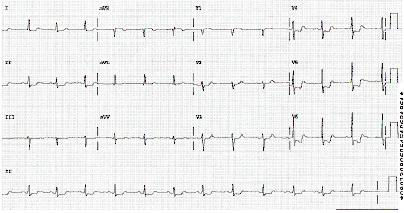Resumen
Definición
Anamnesis y examen
Principales factores de diagnóstico
- dolor torácico
- Factores de riesgo para enfermedades cardiovasculares
- sudoración marcada
- shock cardiógeno
- Insuficiencia cardíaca aguda
Otros factores de diagnóstico
- náuseas y vómitos
- arritmias
- ruido cardíaco anormal
- dolor epigástrico
- disnea
- síncope
- dolor de espalda
Factores de riesgo
- tabaquismo
- hipertensión
- diabetes
- obesidad y fenotipo del síndrome metabólico
- comportamiento sedentario e inactividad física
- dislipidemia
- enfermedad renal crónica
- aterosclerosis (antecedentes de angina, infarto de miocardio, accidente cerebrovascular, accidente isquémico transitorio, enfermedad vascular periférica)
- antecedentes familiares de enfermedad arterial coronaria prematura
- edad >60 años
- consumo de cocaína
- depresión
- trombosis del stent o reestenosis
- apnea del sueño
- procedimientos quirúrgicos (incluidos períodos intraoperativos y postoperativos)
- migraña
- Resultados adversos del embarazo
Pruebas diagnósticas
Primeras pruebas diagnósticas para solicitar
- electrocardiograma (ECG)
- troponina de alta sensibilidad
- ecocardiografía
- radiografía de tórax
- hemograma completo
- urea, electrolitos y creatinina
- pruebas de función hepática
- glucemia
- proteína C-reactiva
Pruebas diagnósticas que deben considerarse
- angiografía coronaria invasiva (ICA)
- lípidos
Algoritmo de tratamiento
características de riesgo muy alto o alto riesgo (sospecha o confirmación de IMSEST)
sin características de alto riesgo (sospecha o confirmación de IMSEST)
después del IMSEST
Colaboradores
Consejeros especializados
Shrilla Banerjee, MD, FRCP
Consultant Interventional Cardiologist
East Surrey Hospital
Surrey and Sussex Healthcare NHS Trust
UK
Divulgaciones
SB has received speaker fees for educational lectures (presentation content was her own) and meeting participation from Menarini, Edwards Lifesciences, Abbott Vascular, and Shockwave IVL. She has also participated in an Advisory Board for Sahajanand Medical Technologies Limited. SB has received travel sponsorship from Biosensors International to attend the PCR meeting in Paris in 2022. She has prepared a manuscript on coronary microvascular dysfunction for Abbott for Cardiovascular News (no royalties).
Adam Hartley, MBBS, BSc, MRCP
Wellcome Trust Clinical Research Fellow
Imperial College London
Specialist Registrar in Cardiology
Imperial College Healthcare NHS Trust
London
UK
Divulgaciones
AH declares that he has no competing interests.
Acknowledgements
BMJ Best Practice would like to gratefully acknowledge the previous expert contributors, whose work has been retained in parts of the content:
Resham Baruah MBBS, BSc MRCP, PhD
Consultant Cardiologist
Chelsea and Westminster Hospital NHS Foundation Trust
Royal Brompton & Harefield NHS Foundation Trust
London
UK
Cody S Deen, MD
Assistant Professor of Medicine
Director of Cardiology
Hillsborough Hospital
University of North Carolina
Hillsborough
NC
Divulgaciones
RB has received honoraria/speakers’ fees from Novartis and Boehringer Ingelheim. CSD was previously the Director of Cardiac Rehab for Chatham Hospital, which was financially set up as a consultancy relationship, until 2017. CSD has spoken (unpaid) at the Update in Cardiology and Update in Internal Medicine Conferences at UNC for the last 5 years. CSD has served as the PI for the Dal-GeneE (site now closed) and the ACCELERATE Trials at the University of North Carolina (trial now completed). Each trial required paid travel to an investigator meeting.
Revisores por pares
Gavin Galasko, BM, BCh, MA, DM (Oxon), FRCP
Consultant Interventional Cardiologist
Director of Research, Development and Innovation
Blackpool Teaching Hospitals NHS Foundation Trust
Blackpool
UK
Divulgaciones
GG declares that he has no competing interests.
Agradecimiento de los revisores por pares
Los temas de BMJ Best Practice se actualizan de forma continua de acuerdo con los desarrollos en la evidencia y en las guías. Los revisores por pares listados aquí han revisado el contenido al menos una vez durante la historia del tema.
Divulgaciones
Las afiliaciones y divulgaciones de los revisores por pares se refieren al momento de la revisión.
Referencias
Artículos principales
Amsterdam EA, Wenger NK, Brindis RG, et al. 2014 AHA/ACC guideline for the management of patients with non-ST-elevation acute coronary syndromes: a report of the American College of Cardiology/American Heart Association Task Force on Practice Guidelines. J Am Coll Cardiol. 2014 Dec 23;64(24):e139-228.Texto completo Resumen
Byrne RA, Rossello X, Coughlan JJ, et al. 2023 ESC guidelines for the management of acute coronary syndromes. Eur Heart J. 2023 Oct 12;44(38):3720-826.Texto completo Resumen
National Institute for Health and Care Excellence. Acute coronary syndromes. Nov 2020 [internet publication].Texto completo
National Institute for Health and Care Excellence. Recent-onset chest pain of suspected cardiac origin: assessment and diagnosis. Nov 2016 [internet publication].Texto completo
Artículos de referencia
Una lista completa de las fuentes a las que se hace referencia en este tema está disponible para los usuarios con acceso a todo BMJ Best Practice.

Diferenciales
- Infarto de miocardio con elevación del segmento ST
- Angina inestable
- Disección aórtica
Más DiferencialesGuías de práctica clínica
- ESC guidelines for the management of acute coronary syndromes
- Acute coronary syndromes
Más Guías de práctica clínicaCalculadoras
Puntuación GRACE para el pronóstico del síndrome coronario agudo
Puntuación de trombolisis en el infarto de miocardio (TIMI) para angina inestable o infarto de miocardio sin elevación del segmento ST
Más CalculadorasVideos
Demostración animada de como realizar un electrocardiograma (ECG)
Más vídeosFolletos para el paciente
Qué puede hacer para prevenir otro ataque al corazón
Ataque al corazón: ¿qué es?
Más Folletos para el pacienteInicie sesión o suscríbase para acceder a todo el BMJ Best Practice
El uso de este contenido está sujeto a nuestra cláusula de exención de responsabilidad